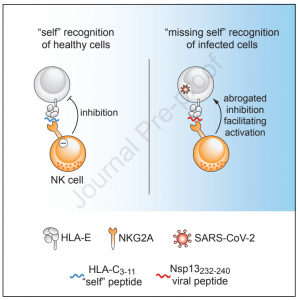Researchers today are still trying to understand how the immune system’s natural killer (NK) cells identify SARS-CoV-2 infected cells. In a recent paper, Hammer, et al., have reported that NK cells respond to a certain peptide on the surface of infected cells (Figure 1).
A form of white blood cells that make up the immune systems, NK cells, are able to recognize diseased cells without previous infection and eliminate them. This ability is tightly regulated by activating and inhibiting receptors. These receptors react to specific molecules presented on the surface of specific cells.
In this present study, the researchers showed that the infected cells are recognised by NK cells that carry a particular receptor, NKG2A, which is able to detect the peptide presented on the surface of infected cells. NK cell activation is complex and they showed that the peptide blocked the inhibition of NK cells, allowing them to activate and execute their function.
To answer their research question they first made us of computer simulations with parameters validated in the laboratory. Following on from this they infected human lung cells with SARS-CoV-2 in a controlled environment, reporting that NK cells with the receptor show an elevated level of activation when compared to NK cells without the receptor.
This study provides insight into how immune cells react to SARS-CoV-2 infection. This provides great support when needing to monitor new variants and when trying to see how the immune system will react to these new variants.
In their own words:
“… show that SARS-CoV-2 Nsp13232-240 presented by HLA-E abrogates inhibition of NKG2A+ NK cells. Our data reveal that HLA-E/Nsp13232-240 complexes are formed efficiently but fail to engage NKG2A, thereby enabling unleashed NKG2A+ NK cell effector functions by missing self-recognition…We thus propose that NK cells could sense a shift in the HLA-E peptide repertoire from self-peptides to a virus-peptide and in such way could utilize NKG2A as an innate recognition module to detect SARS-CoV-2-infected cells.”
It must be noted that there were several limitations to this study.
Journal article: Hammer, Q., et al., 2022. SARS-CoV-2 Nsp13 encodes for an HLA-E-stabilizing peptide that abrogates inhibition of NKG2A-expressing NK cells. Cell Reports.
Summary by Stefan Botha











